“Tribute to Masters” Section Releases the Film List of Jean-Pierre Melville
Abstract: Jean-Pierre Melville was a pioneer in independent filmmaking and French New Wave Film Movement. This year marks the 100th Birthday of Jean-Pierre Melville, and to commemorate this outstanding movie director, Shanghai International Film Festival will screen his films in the “Tribute to Masters” Section.
The 20th Shanghai International Film Festival (SIFF) will be held from June 17 to 26, 2017. L\'armée des Ombres (Army of Shadows), a movie by French filmmaker Jean-Pierre Melville to reflect on resistance wars in World War II, was deeply appreciated by the audience, which was screened in the special program on Anti-Fascist War Films in the 18th SIFF in 2015. This year being the 100th birthday of the director, SIFF and fans are to commemorate this great New Wave movie director by screening his works in the “Tribute to Masters” Section . Today the list of his movies to be screened in theatre was announced: Le Cercle Rouge, Léon Morin, Prêtre, Un Flic, Bob le Flambeur, and Le Doulos, all of which are 4K restorations except Un Flic.
Jean-Pierre Melville, formerly known as Jean-Pierre Grumbach, was born in a Jewish family in France in 1917. He joined the army in 1937. He named himself after his favorite American writer Melville when he fought with the French Resistance in 1940 during Nazis’ invasion and kept the name hereafter. In 1945 when he retired, Melville, a movie fan ever since a little boy, chose filmmaking as his lifelong career. In his 26-year-long filmmaking life, he directed 13 full-length films, most of which were gangster movies. As the “King of Dark and Crime Movies”, Melville was best known for his minimalism, coldness, violence and restrain. It is quite undeniable that his personal style was hugely influenced by the war. Léon Morin, Prêtre to be showed in SIFF this year tells a story in the World War II, which is full of accusations against and fear of the war.
His filmmaking techniques were greatly inspired by American gangster and crime movies, character building had a touch of the Japanese Jidaigeki, and his aesthetic tastes and dark sense of humor were totally French. This blended style made his films one-of-a-kind. His classic dark and crime films, including Le Doulos, Le Cercle Rouge and Un Flic (his last film), which will be screened at SIFF this year, made him a filmmaking master across the world. His style leaves a profound impact on famous directors such as Martin Scorsese, John Woo Yu-Sen and Quentin Tatantino. In addition, it was starring in Melville’s films such as Le Cercle Rouge that made it possible for Alain Delon to start a new era in his acting career.
Absolute control of the films is what Melville preferred. He knew exactly what he wanted. From early films to last ones, he did everything he could from script writing, directing to editing. Only in this way could he fully practice what was on his mind throughout the entire film. Melville pioneered and led the French New Wave Film Movement with new. Reputed as the Godfather of French New Wave, He is considered as one of the forefathers of the New Wave Movement by film historians for the filmmaking concepts and techniques he demonstrated, which started the French New Wave.
Melville once said that his biggest ambition was to “become immortal and then die”. At the age of 55, Melville died of a heart attack at the height of his career. Immortal has he already become.
Le cercle rouge
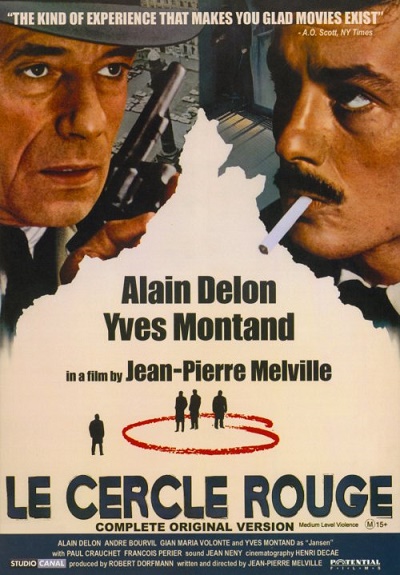
Director: Jean-Pierre Melville
Writer: Jean-Pierre Melville
Stars: Alain Delon/Bourvil/Gian Maria Volontè/Yves Montand/Paul Crauchet
The film is a masterpiece, known as of “the pure perfection and classic”. The storyline is set around a jewelry heist schemed by a thief who just did his jail time, an inmate who escaped from prison and a police officer who got fired. The most classic scene is the 30-minute-long robbery where images worked seamlessly with the music, but words were redundant. Melville’s personal style was fully fledged. “When men, even unknowingly, are to meet one day, whatever may befall each, whatever the diverging paths, on the said day, they will inevitably come together in the red circle.” He said.
Léon Morin, prêtre
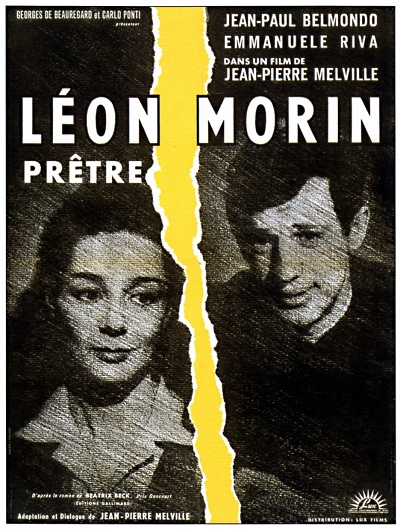
Director: Jean-Pierre Melville
Writer: Jean-Pierre Melville
Stars: Jean-Paul Belmondo/Emmanuelle Riva/ Irène Tunc/ Nicole Mirel
Léon Morin, Prêtre is the biggest box office hit of Melville’s movies. Adapted from Prix Goncourt-winning novel, the film is about the philosophic reflection at the backdrop of World War II. Unlike his previous minimalist movies, Léon Morin, Prêtre appears to be full of dialogues. However, every line is substantial in the seemingly large amount of dialogues, which is another to be minimalist.
Un flic
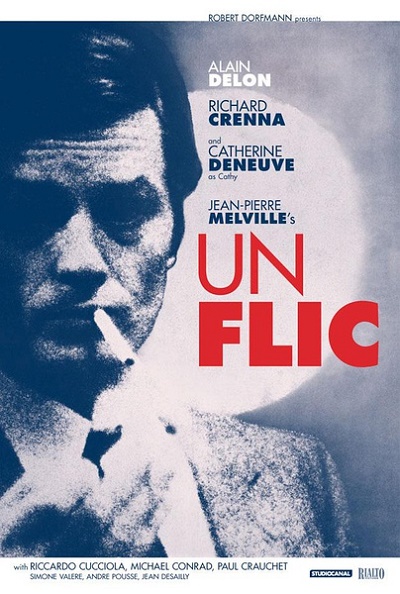
Director: Jean-Pierre Melville
Writer: Jean-Pierre Melville
Stars: Alain Delon/Richard Crenna/Catherine Deneuve/ Riccardo Cucciolla
Un Flic was Melville’s the last film, which is also starred by Alain Delon. This time, he is a good man: Commissaire Edouard Coleman, which is different from the previous ones. His good friend is the very principal of a bank robbery who he is to be after. At the same time, both of them love the same woman, Cathy. Once A Thief, a well-known movie to Chinese audience, was a tribute to Un Flic, according to the movie director of Once A Thief, John Woo Yu-Sen.
Bob le flambeur
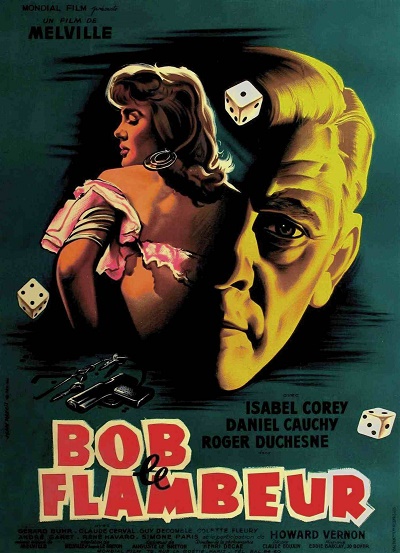
Director: Jean-Pierre Melville
Writer: Auguste Le Breton/Jean-Pierre Melville
Stars: Roger Duchesne/Isabelle Corey/ Daniel Cauchy/ Jean-Pierre Melville
Bob le Flambeur was filmed in 1956. It wasn\'t until 1955 when Melville started making his first gangster movie Fever Heat. Bob le Flambeur had already shown Melville’s personal artistic style. With Jazz music goes, the whole film is calm, absurd and fast-paced with a hue of black humor. The story is very simple: Bob, a gambler, and his friends planned to rob a casino. After having done all the preparations, Bob missed the planned time due to gambling, and then caught by the police because his gang friends told on him, which is the end of the story. Interestingly, the female character in this film is like a red thread in the darkness, quitely intertwining with the dark storyline and leading everything to a dead end.
Le doulos
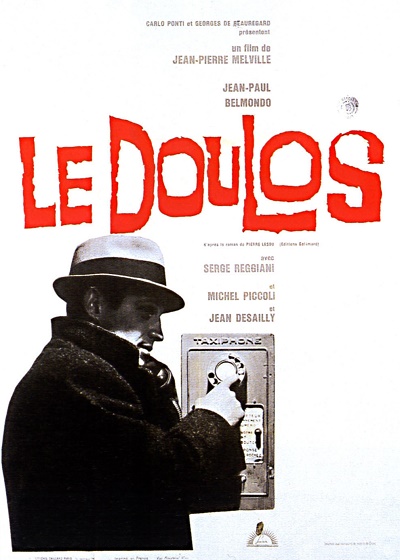
Director: Jean-Pierre Melville
Writer: Auguste Le Breton/Jean-Pierre Melville
Stars: Jean-Paul Belmondo/Serge Reggiani/Jean Desailly/René Lefèvre
Adapted from the novel Le Doulos published in 1946, the film tells a story about Maurice, a thief. One day, his friend Silien came over with some essential tools for the theft he was planning. Together with Silien came the police as well. The plot keeps turning and twisting until the very end when the mystery was finally unraveled.
This is an underestimated film, hardly mentioned by the public. When Léon Morin, Prêtre became such a hit in 1961, Melville had more money to make films that really spoke for him. This was when Le Doulos came into being. In this movie, Melville perfectly blended American and French filmmaking styles and made it into his own dark style.







